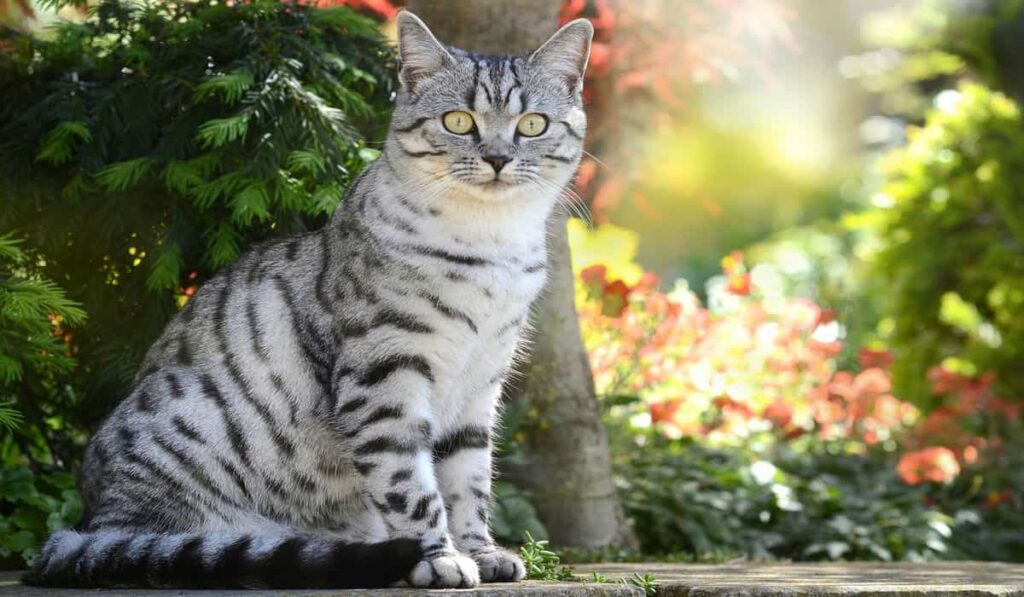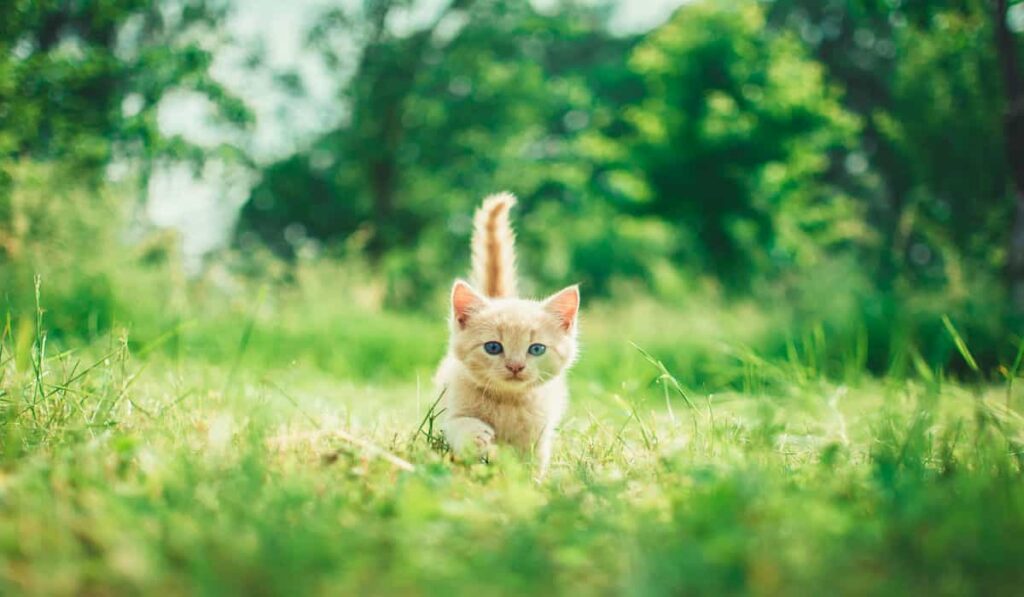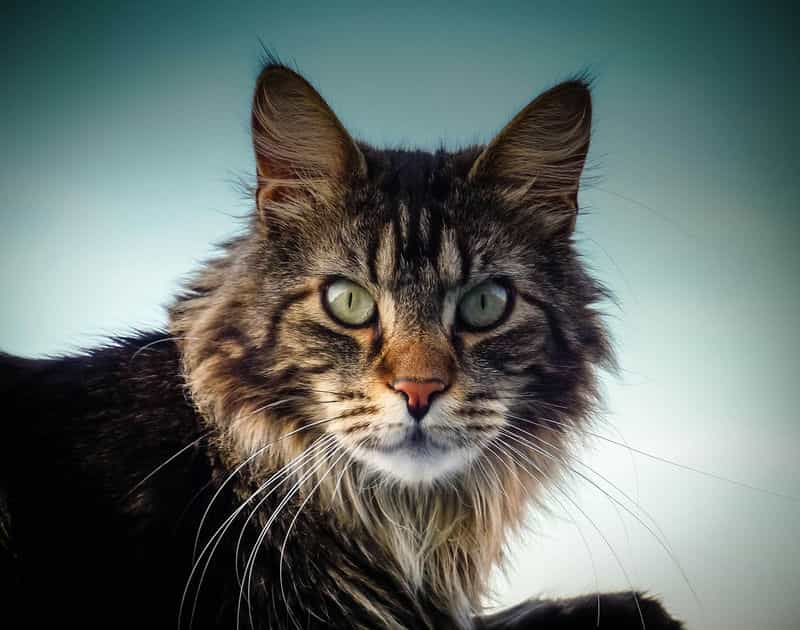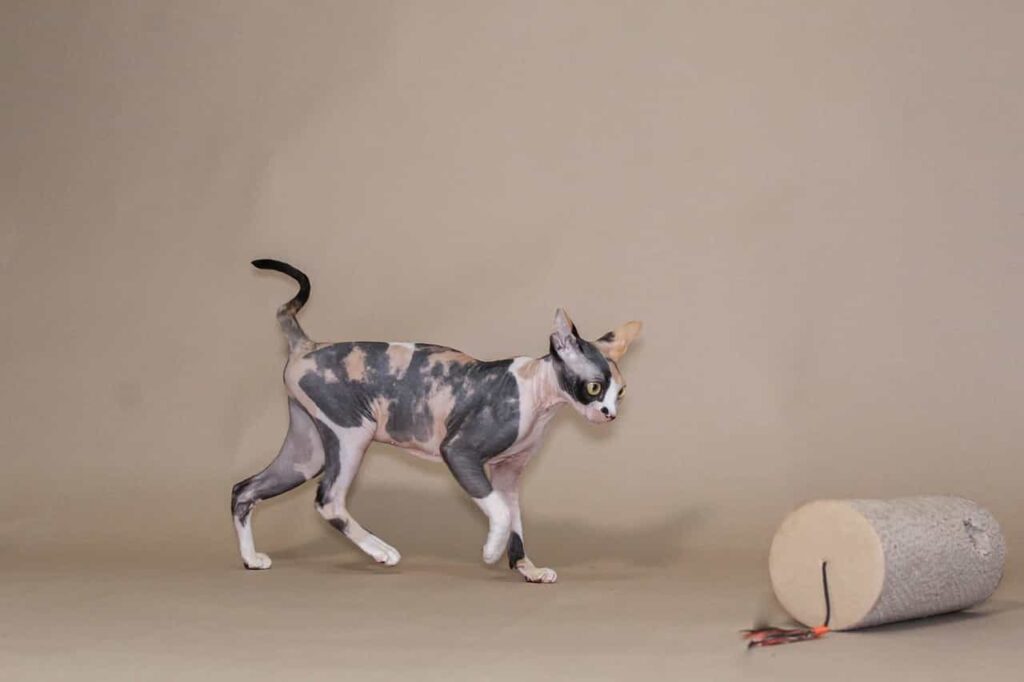Discover the captivating world of Savannah Cats, a breed as majestic as it is mysterious. Known for their striking appearance and dynamic personality, Savannah Cats embody an exotic charm that has captured the hearts of cat enthusiasts worldwide. Diving into the life of a Savannah Cat is a journey through their unique behavior traits, the intricacies of their care, and the deep bond they form with their owners. These graceful felines, with their impressive physical characteristics and vivid temperaments, are not just pets but members of the family.
From understanding their training and exercise needs to exploring their specific food and nutrition requirements, each aspect of Savannah Cat care offers a glimpse into their fascinating world. Whether you’re considering adopting a Savannah Cat or seeking to deepen your knowledge, this guide will illuminate the path to a fulfilling companionship with one of the most extraordinary cat breeds known today.
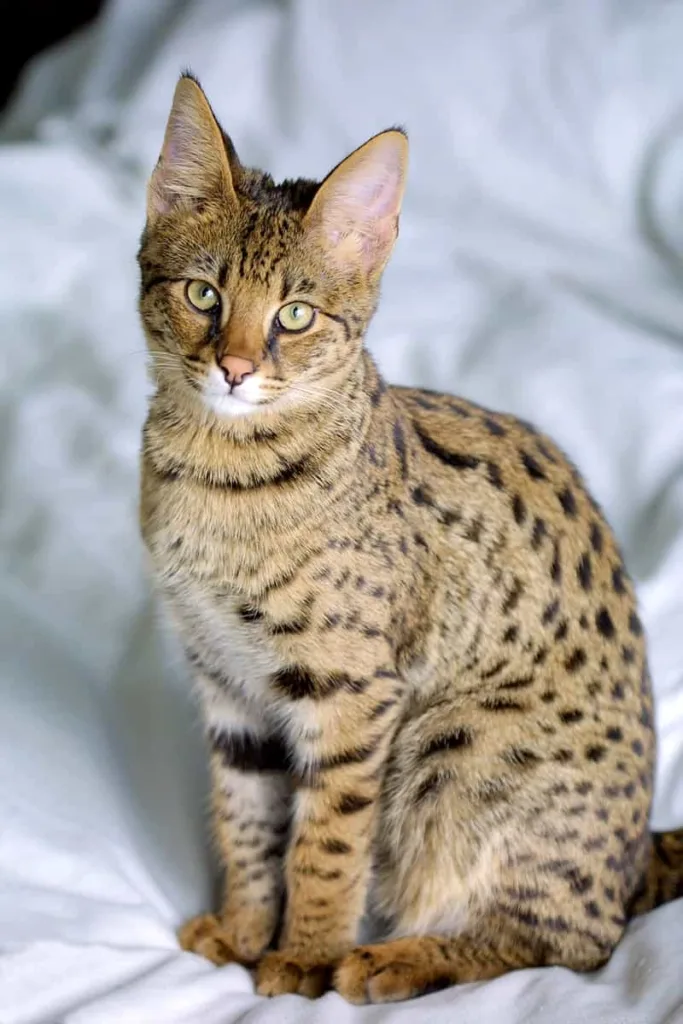

Table of contents
Savannah Cat Breed
One of the largest cat breeds- is Savannah, from the Jungle of Mysterious Africa. A hybrid between an African serval and a Siamese-looking domestic cat and a large and slim offspring with a wild vibe. That means vibrant spotted coats. Its beauty Ecos is the wild beauty of its ancestors, and it also comes with the talkativeness of Siamese cats.
Though Savannahs are good pet cats, now they’re restricted and forbidden as pet cats in some areas and states of the USA. So, now we’ll know all about the exceptional cat breed. A majestic breed is new, expensive, and highly popular.
Breed specialty of Savannah cat
Other names:
Giraffe cat
Personality:
They’re not so much lovable as they originated from Jungles. But the 4th generation (F4) are much more affectionate and friendly to their owners. Savannah cats are not suitable for toddlers and strangers because they feel shy. They’re suitable and friendly with big children and dogs.
Coat patterns:
Spotted, Solid, and Striped, solid Black with no spots. Bengal displays are not allowed by TICA.
Coat length:
Always short
Coat colors:
Black, Black-smoke, Brown spotted, and Black Silver-spotted.
Eye color:
Any color
Length:
Up to 24 inches
Long:
Up to 39 inches
Weight:
18 to 40 lbs
Life expectancy:
Up to 20 years
Hypoallergenic:
No
Origin: Africa
Types of Savanna cat breed
Well, type means how nanny filial generations Savanna cats have. From the first generation to the latest generation, there are 8 types of Savannah cats all over the world (F1- F8).
- F1 Savannah Cat- the most expensive and largest generation among all Savannah cats. Their parents were a wild African Serval cat and a Siamese-look domestic cat. So, fantastic traits are very typical in this breed. They were least suitable for households with toddlers and other pets, as the F1 generation is 50% wild.
- Its length was 18 inches, its weight was 25 Pounds, and its price was nearly $20,000.
- The second generation was F2- more suitable for new interactions and family life. They have several grandparents. Their size and weight were the same as F2, costing about 11,000.
- F3 Savannah cats- It has several great-grandparents, and its weight is 20 Pounds and 17 inches in height. They look wild but better than F1 and F2. They’re more affectionate and familiar to humans.
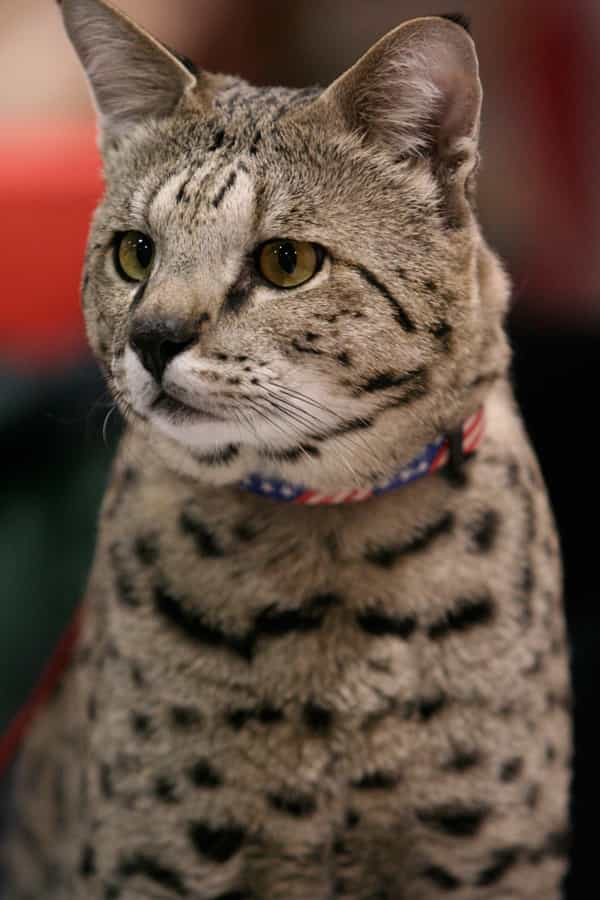

From the F4 generation, Savannas got more predictable and pet because Serval cats are their far ancestor, and wild traits disappeared.
The male Savannah cats are sterile until the sixth generation from the Savannah cat, and female Savannah cats are usually fertile from the first generation.
Origin of the Savannah breed
Well, we know that The first ancestor of Savannah was an African Serval cat who was medium-sized and large-eared and a Simese-looking domestic cat. The hybrid Savanna cats became popular among breeders at the end of the 1990s, and The International Cat Association (TICA) recognized the new breed in 2001 and gave it Championship status in 2012.
There was a crossbreeder who lived in Pennsylvania, USA. He crossbred a male Serval cat that belonged to Suzi Woods with a Siamese female cat to produce the first Savanna cat. Later Pattrick Kelly, the founder of savannahcat.com, developed the breed. He uses Frank’s first Savanna cat’s offspring with other cats.
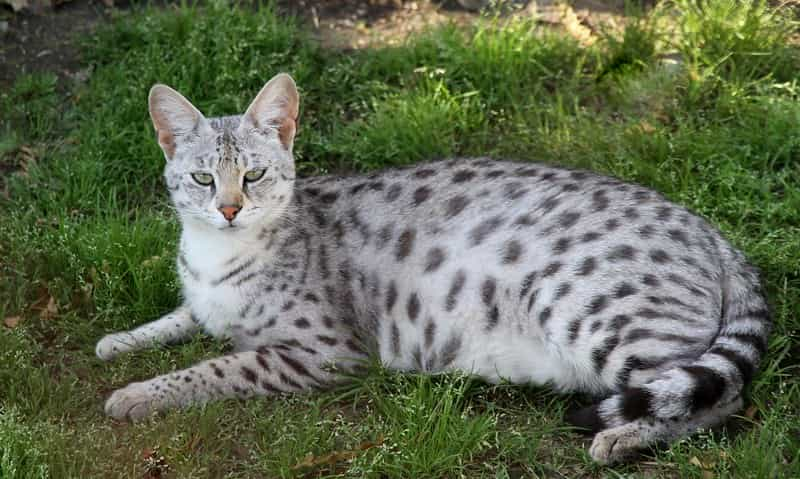

He received the help of Joys Sroufe. They wrote the original version of the Savannah cat breed standard and presented it to TICA. Though the Savannah cat breed has many colors and patterns, TICA accepted only spotted coat patterns and certain colors and color combinations.
Not all Savannahs are purebred or Stud Book Traditional. Purebreds show at least 3 generations of Savannah-to-Savannah breeding on their pedigree. The F4 generation is the earliest to be purebred, but not all of them are.
The appearance of the Savannah breed
Savannah cats are tall, slim, graceful, long-necked, long-legged, lean, and dog-looking with slender bodies. The ears are large, situated at the top of the head, more rounded than other cats, and upright like their ancestors.
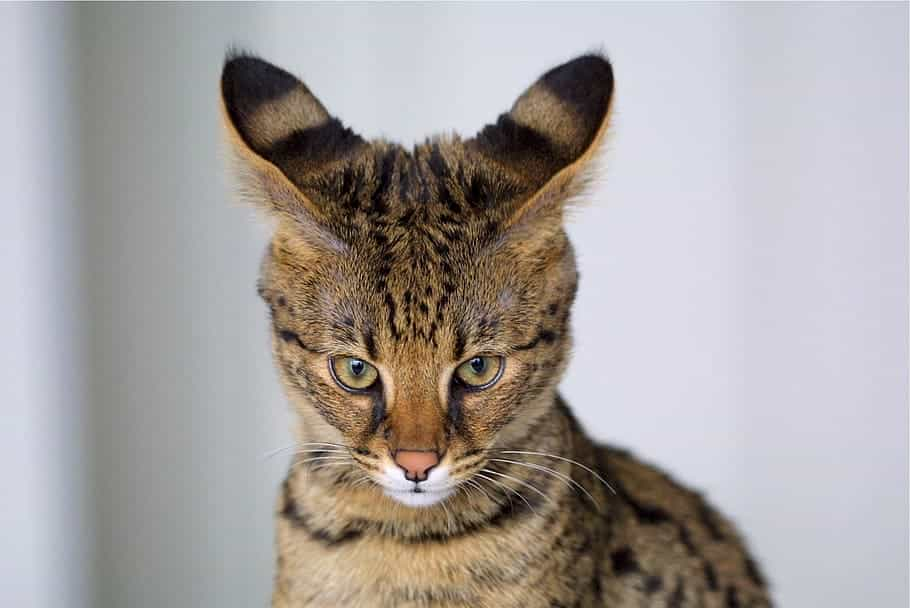

Their head is small according to their body size. Their face looks like a perfect triangle size. Savannah’s inquisitive eyes are medium-sized and can be any color regardless of their coat colors.
How to identify a Savannah cat?
First Method to identify a Savannah cat
Observe the ears:
The African servals have long, large ears directly situated on the head and pointed straightly.
Look at their distinctive eyes:
The hooded and overhanging eyes are flatly situated between the 2 ears. You’ll feel a tiger and wild vibe in their staring as they’re warning you.
Notice the spotted coats of Savannah:
The most distinctive trait of a Savannah is its spotted coat. The markings resemble African wild cats. Though Aavnnahs have been interbred with several Domestic cats, there are still some similarities with African wild cats. Those are-
- The coats can be Brown, Tan, Silver, or Gold with dark spots. It can also be Black with some different shades of Black.
- The spots are round, oval, and elongated or parallel stripes all over the body.
- Savannahs are always shorthaired cats.
Body types:
Savannahs are now medium in size because of the interbreeding with domestic cats. Now they come in 18 lbs, but a purebred Savannah may be up to 40 lbs. Their long legs make them look bigger than other cat breeds.
Watch their personality: They’re not sedate lap cats. They’re active, playful, energetic, curious, friendly, and loyal. They can jump like their ancestors, and their energy can cause trouble for them. So, be careful. Keep the electric wear at a safe distance from the extremely energetic cats.
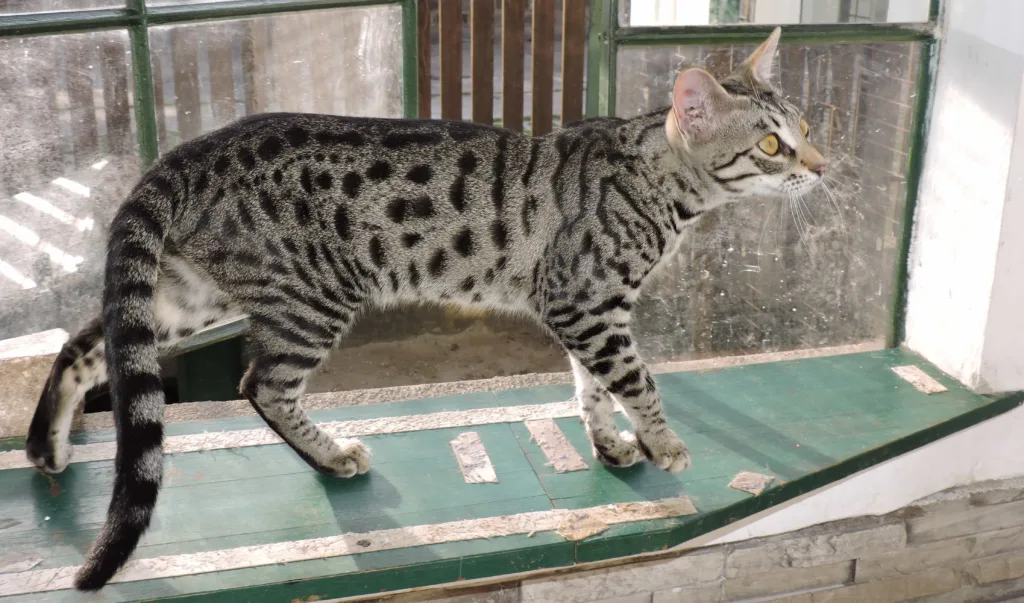

Second Method to identify a Savannah cat
Find the Savannah breed according to the-
Research and terminology:
There are coding systems to find Savannah cats. The code represents how many types of breeds Savannahs interbred with and how many generations are removed.
Temperament and nature of Savannah
There is no matter of wonder if a Savannah cat jumps 7 feet high. You know that their ancestors were wild Serval cats. So, the Savannah breed is very active, playful, intelligent, and clever. They love to run, climb, play with water, and even swim.
They will take part in a bath with you in the bathtub. They’re very fond of water. Even they use their water bowl as a toy. They’re extremely known for their energy and ability to learn new tricks and tips. They have a dog-like personality and high intelligence like dogs. They love human companionship and attention.
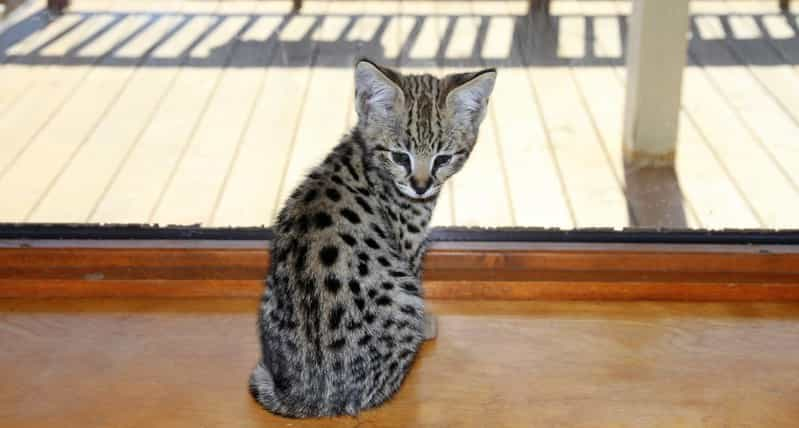

Besides, they bond strongly with their owners and love to receive greetings and company. These cats quickly learn to play fetch by themselves and adore retrieving balls. They also love the outdoors.
You’ll get a happy, loving, and devoted Savannah if you meet their needs. These cats follow you around, watch what you’re doing, and will participate in your activities. A bored Savannah becomes mischievous and will resort to unwanted behavior to get your attention.
They’re skilled escaping artists. They’re able to open the doors and cupboards. They are friendly with dogs and other cats if they’re socialized at an early age. They’re also suitable for big children if they’re well-mannered, not for toddlers.
The early generation easily got frightened, and the issue still works in the new generation. They’re very territorial. So, be careful while choosing the generation.
Savannahs hate to be left alone for long periods.
Savannah Cat Caring tips
Looking after a Savannah cat isn’t an easy task. You need to be patient and spend a lot of time with them. They need various games. So, provide them with various cat teasers, interactive toys, a climbing tower beside the window, and a rich environment.
You must provide them with many climbing spaces and a wall beside the window. Besides, Buy shelves and place them all around the room, so your Savannah can easily circle the room above. Get them food puzzles and hide their food across the house so that they become engaged in finding those.
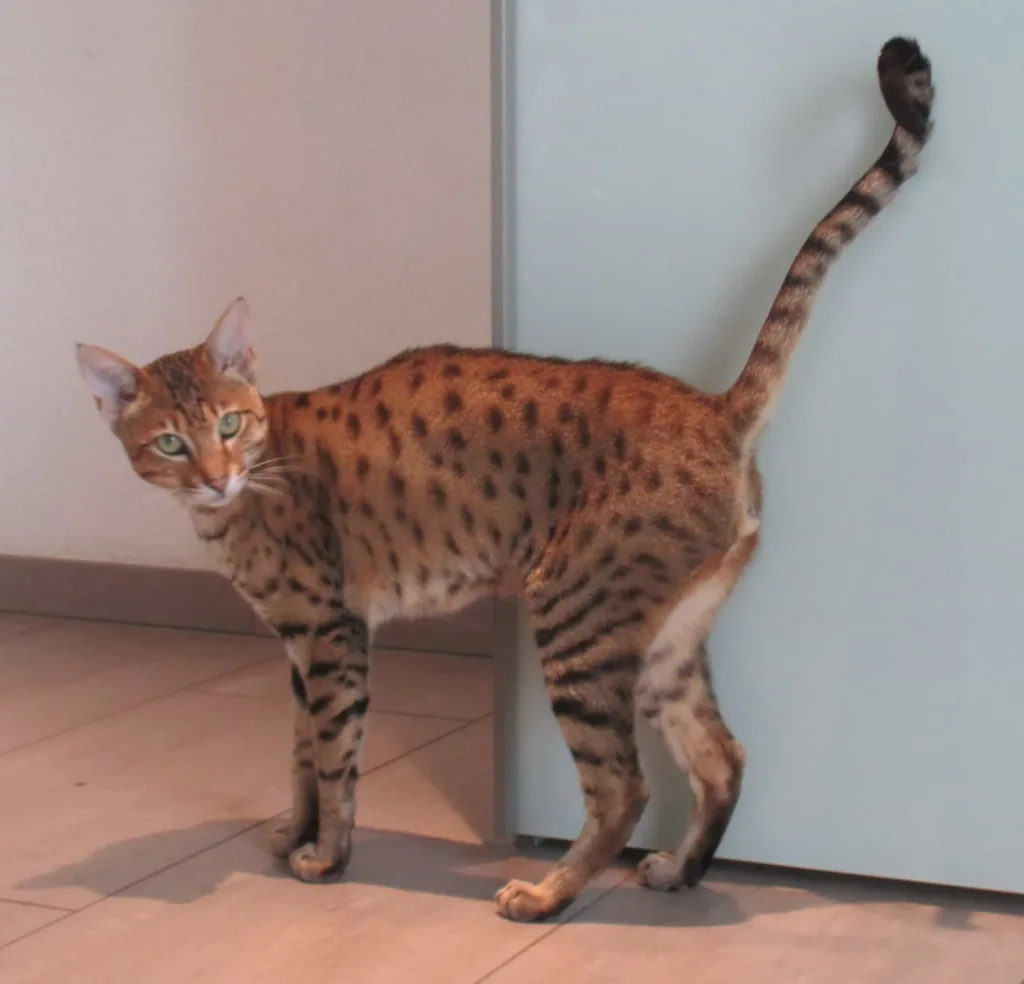

As your Savanna loves to go outside, don’t leave them unsupervised. Take it for a walk, just like the dogs.
They’re shorthaired cats, so just weekly coat brushing is enough. Like other cats, you need to take off their teeth, nails, ears, and eyes as usual. Adopt it from a reputed breeder and gather knowledge about their personality traits. Otherwise, you’ll face problems with the big cats.
Not to mention that your Savannah needs to be kept indoors, and if you leave it outside, leave it with supervision. It depends on which area you live in. if you live in a calm and less populated area, then you can leave it outside alone.
Health and problems that Savannah cats are prone to
Savannah cats are very prone to Hypertrophic Cardiomyopathy (HCM). They are also sensitive to Ketamin Anesthesia, Cancer, respiratory issues, Asthma, dental disease, and unsettled stomach. So, always stay concerned about their health issues and take your big cat to the Veterinarian for a regular checkup.
What about their diet? Their proper diet and nutrition are a big part of their caring and grooming. Their diet should be well-balanced.
Some breeders advise you to feed them a raw diet, and some will advise supplements. Most of the breeders agreed that Savannahs need more taurine than regular cats. In that case, consult your breeder and choose the best diet for your Savannah. The diet and nutrition will be changed with their age.
The differences between Serval cats and Savannah cats:
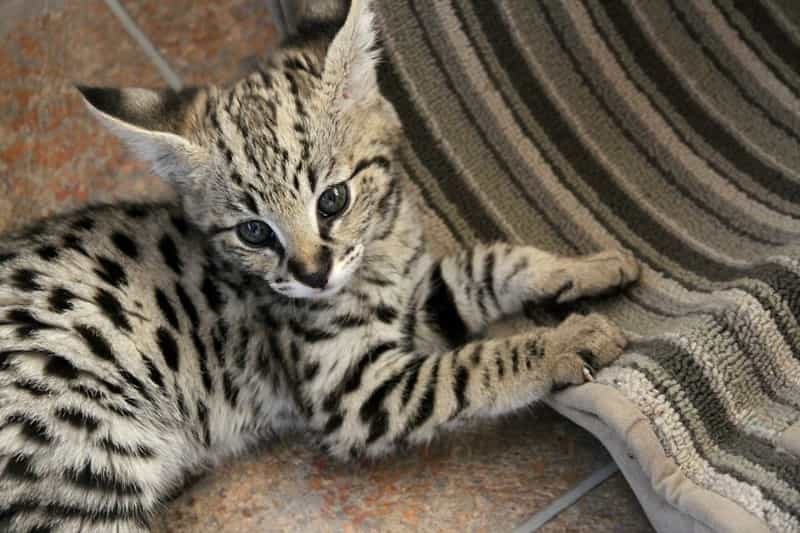

Though Savanahs and Servals are genetically related to each other, they’re a fully separated breed. African servals are taller than Savannahs. More or less, they can be up to 17-24 inches tall and 24-40 inches long, and their weight is 12-25 Pounds. On the other hand, the hybrid Savanah can be 24 inches tall, 39 inches long, and weigh 40 lbs.
Some interesting facts about Savannah cat
- Savanna cats are blessed with hunting skills. So, if you own a Savannah cat. Then don’t keep any small creatures like Guinea pigs, Hamsters, Birds, Fish, etc., in your house because they aren’t safe from Savannah’s hunting ability.
- Two Savanah cats held the world record as the tallest domestic cats.
- They play with their water bowls.
- They’re illegal and restricted in some areas and states of the USA. So, you must know the laws about the pet animal of your area to adopt a Savannah cat.
- Savannah cats are known for their dog-like personality.
- It is forbidden in some areas of the USA. So, you need to know whether you’re from those areas.
- It’s better to adopt a later-generation Savannah than the earlier generation.
- Savannahs are excellent jumpers. So, you need to be cautious about your shelves and cupboards.
- They are very fond of water. So, keep the doors of the washrooms and kitchens off. Don’t be surprised if you see that your cat is playing with its water bowl.
The forbidden areas for Savannah cat
In Australia, the Savannah breed is banned. No one can carry, buy, sell, or adopt a Savannah cat. In the USA, the following states don’t allow the breed to have or may need the permission of the local police station:
Alaska:
F4 and later generations are allowed.
Colorado:
Same as Alaska.
Delaware:
Without permission is not allowed.
Georgia:
Illegal.
Hawaii:
Same as Georgia.
Ohio:
Same as Delaware.
Lowa:
Same as Alaska.
Massachusetts:
Same as Alaska.
Nebraska:
Same as Georgia.
New Hampshire:
Same as Alaska.
New York: F5 and later generations are allowed.
Rhode Island:
Same as Georgia.
Texas:
Varies by county.
Vermont:
Same as Alaska.
So, know the guidelines and restrictions before adopting a Savannah cat.
Savannah breed overview
A very expensive breed with a wild look. The result of an African Serval and a Siamese cat. Savannahs are beautiful, exotic, active, playful, friendly, affectionate, and high jumpers. The only breed that has many exciting generations.
The most important thing is the Savannah breed is not for all. There are so many rules and regulations that you need to know before adopting them. Hybrid cats are very fond of water.
The best option is the website of Savannah Cat Rescue. The breed is rare, so there is a very small chance of getting them from a breeder. Only specific clubs and rescue groups can provide you with a real Savannah.
Some name suggestions for your exotic Savannah
Shona, Tau, Asha, Zuri, Cleopatra, Nile, Ekon, etc.
Savannah Cat Training and Exercise
Training and exercise are pivotal in the life of a Savannah Cat, a breed known for its high energy levels and intelligent mind. Engaging in regular training routines not only stimulates their mental agility but also strengthens the bond between cat and owner. When training Savannah Cat kittens, it’s beneficial to start early, using positive reinforcement techniques that encourage their natural curiosity and learning capacity. Incorporating playful activities for Savannah Cats into their daily routine is essential. These activities should cater to their inherent need for physical activity, given the breed’s high exercise requirements.
Incorporating various types of exercises, such as interactive play sessions, puzzle games, and even agility training, can keep Savannah Cats physically fit and mentally sharp. It’s crucial to ensure that their environment is stimulating and enriching, as boredom can lead to destructive behavior. Given their athletic build and Savannah Cat physical characteristics, they are well-suited for activities that involve climbing and jumping. However, it’s important to monitor their activity to prevent overexertion, particularly in light of common health concerns in Savannah Cats.
Additionally, understanding the Savannah Cat’s behavior traits and temperament can guide the creation of an effective training regimen. For instance, their sociable nature makes them more amenable to training sessions that involve human interaction. Regular exercise and interactive play are not just beneficial for their physical health but also for their emotional well-being, helping to maintain a happy and balanced Savannah Cat.
Savannah Cat Food and Nutrition
The dietary needs of Savannah Cats are as unique as their majestic appearance. Providing the right food and nutrition is crucial for maintaining their health and vitality. Savannah Cats, known for their large size and active lifestyle, require a diet that’s rich in high-quality proteins to support their muscular build and energy levels. Feeding guidelines for Savannah Cats often recommend a combination of high-grade commercial cat food and raw or cooked meats, mimicking their natural dietary habits.
When considering Savannah Cat dietary needs, it’s essential to ensure a balanced intake of vitamins, minerals, and amino acids. Given their Savannah Cat breed origins, which include wild ancestry, some owners choose to incorporate a raw diet, which should be done under veterinary guidance to ensure nutritional completeness and safety. The diet should also consider any common diseases in Savannah Cats, tailoring the nutrition to prevent or manage health issues.
Hydration is another vital component of their diet. Since Savannah Cats may not have a high drive to drink water, incorporating wet food or broths into their diet can aid in maintaining adequate hydration. Regular consultations with a vet can provide tailored advice, especially considering the Savannah Cat’s physical characteristics and any specific health concerns. By offering a well-balanced diet and monitoring their food intake, owners can contribute significantly to the longevity and well-being of their Savannah Cat.
Savannah Cat Adoption Guide
Adopting a Savannah Cat is a decision that brings immense joy and companionship, but it also requires thorough preparation and understanding. The Savannah Cat adoption process begins with researching and choosing a reputable breeder or rescue center. It’s important to select breeders who adhere to high standards and ethical breeding practices, as this impacts the health and temperament of the cat. When considering adoption, potential owners should be well-versed in Savannah Cat behavior traits and care requirements to ensure a good match.
During the adoption process, inquire about the health history and temperament of the specific Savannah Cat or kitten. Understanding their background, especially in terms of health concerns of Savannah Cats, is crucial for future care. Prospective owners should also prepare their home environment, considering the Savannah Cat’s exercise requirements and need for space to explore and play.
Post-adoption, it’s important to slowly introduce the Savannah Cat to their new environment and any existing pets. Given their sociable nature, Savannah Cats generally adapt well, but like all cats, they benefit from a gradual and patient introduction. Integrating proper feeding guidelines, grooming routines, and regular veterinary care from the start sets the foundation for a healthy and happy life with your new feline companion.
Adopting a Savannah Cat is not just about bringing a pet into your home; it’s about welcoming a new member into your family. With the right preparation and commitment, it can be an incredibly rewarding experience, filled with affection and unique adventures.
Savannah Cat Socialization guide
Socialization is a key component in the life of a Savannah Cat, crucial for their emotional well-being and behavior development. Known for their outgoing and confident temperament, Savannah Cats often exhibit a keen interest in social interactions. However, effective socialization requires structured and positive experiences, particularly during their kittenhood. Introducing Savannah Cat kittens to various stimuli such as different people, pets, environments, and sounds can significantly aid in their social development. This exposure helps them become well-adjusted and reduces the likelihood of fearful or aggressive behaviors later in life.
Engaging in socializing Savannah Cats involves more than just exposure; it’s about creating positive and rewarding experiences. Use treats, affection, and play to reinforce good social behaviors. It’s also important to respect their boundaries and allow them to retreat when they feel overwhelmed. Given their high intelligence and Savannah Cat behavior traits, they respond well to interactive play that challenges their minds and satisfies their curiosity.
Remember, every Savannah Cat has its unique personality. Some may be more outgoing, while others could be reserved. Tailoring the socialization process to their individual needs ensures they feel secure and confident. Regular socialization not only enhances their quality of life but also deepens the bond they share with their human family, making them affectionate and loyal companions.
Savannah Cat Maintenance and Safety Guide
Proper maintenance and ensuring safety are paramount in caring for a Savannah Cat, a breed known for its adventurous spirit and physical prowess. Regular maintenance involves a holistic approach to their health, diet, exercise, and living environment. Savannah Cats, with their distinctive physical characteristics, require a balanced diet to maintain their health and energy. Adhering to recommended feeding guidelines for Savannah Cats is crucial, especially considering their larger size and higher activity levels compared to typical domestic cats.
Safety is a significant concern, particularly for a breed as curious and active as the Savannah. They require a secure environment where they can explore without the risk of injury or escape. This includes ensuring windows and balconies are safely screened and removing hazardous items or toxic plants from their reach. Given their strong hunting instincts, it’s also essential to provide them with appropriate outlets for these behaviors, such as interactive toys and climbing structures, to prevent them from engaging in destructive activities.
Regular grooming, although less demanding due to their short coat, is still necessary to maintain their skin and coat health. Regular check-ups with a veterinarian are essential to monitor and address any health concerns of Savannah Cats, including common diseases and genetic health issues specific to the breed.
Maintenance of a Savannah Cat also involves understanding their social behavior and providing them with enough mental stimulation and physical exercise to keep them engaged and content. Creating an enriching environment that caters to their needs helps prevent boredom and associated behavioral issues, ensuring a happy and healthy life for your Savannah Cat.
Conclusion
In conclusion, the Savannah Cat is an extraordinary breed that captivates with its elegance, intelligence, and spirited personality. Embracing the responsibilities that come with caring for a Savannah Cat, from understanding their unique dietary and exercise needs to their socialization and safety, is crucial for fostering a healthy and happy life for these majestic felines. Their distinct behavior traits and physical characteristics make them stand out not just in appearance but also in the depth of the relationship they share with their owners.
Whether it’s through the joy of training and socializing a Savannah kitten, the commitment to their health and maintenance, or the process of adoption, each aspect of caring for a Savannah Cat is rewarding. These cats offer a blend of the wild and the affectionate, bringing adventure and companionship to their human families. By providing them with the care, love, and respect they deserve, owners can ensure that their Savannah Cats thrive, continuing to enchant and inspire all who encounter their remarkable beauty and charm.

